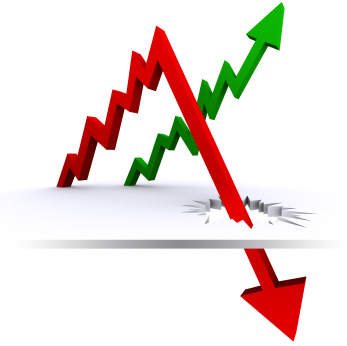Consequences of inflation
 Syllabus: Discuss the possible consequences of a high inflation rate, including
Syllabus: Discuss the possible consequences of a high inflation rate, including
- greater uncertainty,
- redistributive effects,
- less saving, and
- the damage to export competitiveness.
The effects of a period of inflation depend on:
- The rate at which prices are rising
- Whether the rate is accelerating or not
- Whether the rate is that which was expected
- How the rate compares with other countries, in particular the main trading partners.
Anticipated inflation
The seriousness of the costs of inflation depends mainly on whether it is anticipated (expected) or not. If people anticipate the inflation rate, then the effects will be less as they will build these expectations into their behaviour. The costs of anticipated inflation may include:
- Inflation reduces real income - prices rise so the same amount of money cannoy buy as much. People have less incentive to save as the opportunity cost of saving is rising continuously and less saving means less funds available for investment.
- Costs to firms - called menu costs as firms will need to keep changing their prices on retail shelves, in catalogues and on price lists - also known as administrative costs
- Costs to individuals - called shoe-leather costs - individuals will be less likely to hold as much cash, as it loses its value quicker when there is inflation. Also they have a greater incentive to search out the best deals on the goods they buy. This means going to the bank more often to get cash out and wander around shops more - hence the term shoe-leather costs. It would, perhaps, be truer these days to call them car tyre costs, or perhaps even telephone/internet costs given the arrival of telephone and internet banking, but the expression 'shoe-leather costs' has stuck in economic theory.
- Distortions to the tax system - both direct and indirect taxes are affected by inflation. Many indirect taxes are for a fixed amount. This is often true of taxes on cigarettes, petrol and alcohol. If the amount is fixed, then inflation will gradually erode the amount the government receives in real terms. The price of the good will be going up, but the tax will not. Income tax is also affected, and in this case it individuals and firms that suffer rather than the government. As incomes increase, so individuals and firms may pay more tax. If tax thresholds are not increased in line with inflation, then fiscal drag arises. This is when people are dragged into higher tax bands, or dragged over the threshold for starting to pay tax.
Unanticipated inflation
The costs are more serious if the inflation is unanticipated. The main costs of unanticipated inflation are:
- Uncertainty - inflation makes life very difficult for firms, which want to plan ahead as much as possible. This uncertainty may particularly affect their investment plans. Many investment projects take a long time before they generate returns. If the level of inflation is unpredictable, then firms will find it more difficult to work out if the investment will be profitable. In that case, they may simply not bother to take the risk. So higher inflation may adversely affect investment, and this will slow down economic growth in the long run.
- Wage distortions - some groups will have more power to increase their wages to reflect changing inflation than others and unanticipated inflation is likely to lead to the less well-off in society being hit harder than the better-off, not least because a wage increase of, say, 5% of £10,000 is a lot less than 5% of £100,000.
- Resource costs- if you see that the price of something that you buy has gone up, then that causes a dilemma. Is it just that thing that is more expensive? Or is it all the other brands as well? In other words, has there been a relative price increase (one thing relative to others), or a general price increase (everything increasing in price). If it is a general price increase then you would probably just buy it anyway and then moan about inflation. However, if it is a relative price increase you may want to switch brands. Inflation may therefore distort the price signals in the economy. These price signals are fundamental to the efficient workings of markets and inflation can adversely affect them. Unanticipated inflation can therefore cause allocative inefficiency.
- Redistribution - inflation creates an arbitrary redistribution of income, and is unfair. People who have borrowed money will be better off as they have less to pay back in real terms. Savers, on the other hand, will be worse off as inflation is eroding the value of their savings. People on fixed incomes or with fixed savings, like pensioners, may be the worst off. It can be really demoralising to have saved all your life for retirement, only to find that the money saved is worth less and less every year because of inflation.
- Balance of payments / competitiveness - markets are becoming increasingly globalised and firms have to compete with other firms all over the world. If a country's inflation rate is faster than other countries, then it makes it much more difficult to compete. This will tend to make exports suffer, but at the same time imports become relatively cheaper. Overall, the balance of payments is likely to worsen. The uncertainty that normally accompanies inflation may discourage capital and financial investment from coming into the country as well.
The higher the level of inflation, the more difficult it is to predict. This will almost certainly lead to higher costs.